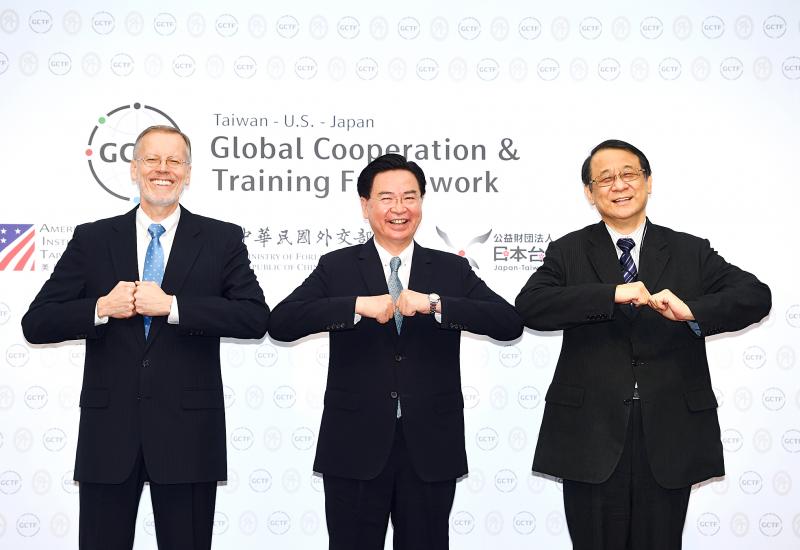Taiwan, the US and Japan yesterday issued a joint statement announcing that they would seek greater cooperation under the Global Cooperation and Training Framework (GCTF) as they marked its fifth anniversary.
In a statement signed by Minster of Foreign Affairs Joseph Wu (吳釗燮), American Institute in Taiwan (AIT) Director Brent Christensen and Japan-Taiwan Exchange Association Taipei Office Chief Representative Hiroyasu Izumi, the offices said that to bolster their partnership, they would be expanding the “frequency, size and scope of the GCTF workshops, including holding more events outside Taiwan,” as well as the “depth and breadth of participation from like-minded countries, including co-hosting programs.”
They would establish a GCTF task force as part of the ministry’s Department of North American Affairs to serve as the GCTF Secretariat, and a GCTF Alumni Network for former participants, the statement said.

Photo: Fang Pin-chao, Taipei Times
Christensen told a news conference that when the framework was established in 2015, the international community did not understand the wealth of professional knowledge and valuable experience Taiwan could provide.
Unlike symbolic international forums, the GCTF is focused and practical, he said, adding that it is focused on topics that are most in need of discussion and it creates tangible results.
The GCTF is free of political interference, and its only purpose is to allow professionals to benefit from Taiwan’s experience and expertise, he said.
The US looks forward to continuing to work with Japan and Taiwan, allowing the world to understand that Taiwan is a reliable partner, democratic role model and force for good, and allowing “real friends, real progress” — which describes Taiwan-US relations — to become the spirit of the cooperation with countries in the Indo-Pacific region, he said.
Izumi said that Japan, Taiwan and the US share the values of freedom, democracy and human rights.
Japan is honored to join the framework, he said.
Japan joined the GCTF as a partner last year.
The theme of the GCTF is practical and meets the needs of the different nations, he said.
Taiwan has received international praise for its fight against the novel coronavirus and made a greater contribution to international society, he said.
Workshops have been affected by the COVID-19 pandemic, he said, adding that they would continue to be held in more flexible ways.
A page dedicated to the framework is to be created on the association’s Web site, he said, adding that the Japanese government hopes to cooperate more actively with Taiwan.
Japan would not, and cannot, leave Taiwan, he said, adding that Japan and Taiwan must act together.
Wu welcomed more like-minded partners to join the platform.
AIT Deputy Director Raymond Green, Japan-Taiwan Exchange Association Deputy Representative Nishiumi Shigehiro, as well as representatives and deputy representatives from Canada, Sweden, Australia, the UK and New Zealand, were among the guests who attended the news conference.
Sweden and Australia have cohosted GCTF events, and the Netherlands is planning to join it.
The GCTF has held 23 international training programs in the areas of public health, women’s rights, energy security, information security and humanitarian aid, among others, inviting the participation of more than 500 government officials and experts from at least 38 nations.

Chinese spouse and influencer Guan Guan’s (關關) residency permit has been revoked for repeatedly posting pro-China videos that threaten national security, the National Immigration Agency confirmed today. Guan Guan has said many controversial statements in her videos posted to Douyin (抖音), including “the red flag will soon be painted all over Taiwan” and “Taiwan is an inseparable part of China,” and expressing hope for expedited reunification. The agency last year received multiple reports alleging that Guan Guan had advocated for armed reunification. After verifying the reports, the agency last month issued a notice requiring her to appear and explain her actions. Guan

GIVE AND TAKE: Blood demand continues to rise each year, while fewer young donors are available due to the nation’s falling birthrate, a doctor said Blood donors can redeem points earned from donations to obtain limited edition Formosan black bear travel mugs, the Kaohsiung Blood Center said yesterday, as it announced a goal of stocking 20,000 units of blood prior to the Lunar New Year. The last month of the lunar year is National Blood Donation Month, when local centers seek to stockpile blood for use during the Lunar New Year holiday. The blood demand in southern Taiwan — including Tainan and Kaohsiung, as well as Chiayi, Pingtung, Penghu and Taitung counties — is about 2,000 units per day, the center said. The donation campaign aims to boost

The Kaohsiung Tourism Bureau audited six hotels in an effort to prevent price gouging ahead of Korean band BTS’ concert tour in the city scheduled for Nov. 19, 21 and 22 this year. The bureau on Friday said that the audits — conducted in response to allegations of unfair pricing posted on social media — found no wrongdoing. These establishments included the local branches of Chateau de Chine, Hotel Nikko, My Humble House, and Grand Hai Lai, it said, adding that the Consumer Protection Commission would have penalized price gougers had the accusations been substantiated. The bureau said the Tourism Development Act

BACK TO WINTER: A strong continental cold air mass would move south on Tuesday next week, bringing colder temperatures to northern and central Taiwan A tropical depression east of the Philippines could soon be upgraded to be the first tropical storm of this year, the Central Weather Administration (CWA) said yesterday, adding that the next cold air mass is forecast to arrive on Monday next week. CWA forecaster Cheng Jie-ren (鄭傑仁) said the first tropical depression of this year is over waters east of the Philippines, about 1,867km southeast of Oluanpi (鵝鑾鼻), and could strengthen into Tropical Storm Nokaen by early today. The system is moving slowly from northwest to north, and is expected to remain east of the Philippines with little chance of affecting Taiwan,